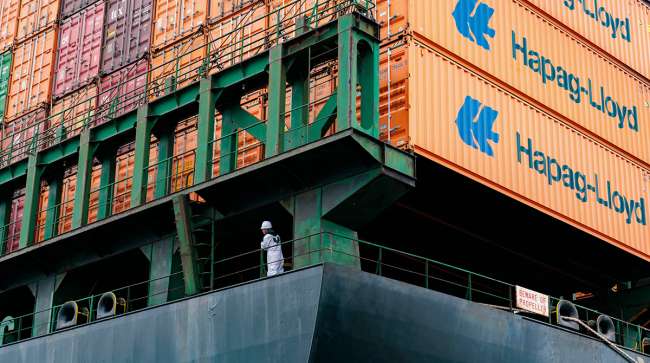A containership at the Port of Philadelphia. (Hannah Beier/Bloomberg)
U.S. lawmakers are reintroducing legislation that aims to revive American shipbuilding, riding off momentum of an executive order from President Donald Trump announced in April.
The bill would put duties on vessels owned or operated by a “country of concern” — namely China, Russia, Iran and North Korea. It would also establish a 25% tax credit for shipyard investments and create a program to boost the number of U.S.-flagged vessels over 10 years by 250.
“Shipbuilding is a national security priority and a stopgap against foreign threats and coercion,” said Sen. Todd Young (R-Ind.), a co-sponsor of the bill. The measure, first proposed last December, “is critical to our warfighting capabilities and keeping pace with China,” Young added.
With Chinese-owned vessels dominating the maritime industry, efforts to revitalize U.S. shipbuilding have swept across Washington in the past year. For instance, the U.S. Trade Representative will put incremental fees on Chinese-owned vessels starting in October as a result of a Biden administration investigation into Beijing’s maritime dominance.
Today at Hudson, @SenToddYoung discussed how the Strategic Commercial Fleet Program, part of the Ships for America Act, will build up the US maritime fleet and protect American supply chains from economic coercion. pic.twitter.com/rQ3DRtIRRj
— Hudson Institute (@HudsonInstitute) April 30, 2025
Bills intended to counter China’s influence tend to be among the few bipartisan initiatives left in an increasingly divided Washington. Other lawmakers sponsoring the measure include Sen. Mark Kelly (D-Ariz.), and Reps. Trent Kelly (R-Miss.) and John Garamendi (D-Calif.).
National Security Adviser Mike Waltz spearheaded the issue during his time in Congress, urging President Joe Biden to invest in maritime defense.
Trump’s shipbuilding executive order was intended to offer new funding streams to support the industry, according to a senior White House official. It also directed the Elon Musk-led Department of Government Efficiency to review past Navy shipbuilding decisions that led to problems, such as a $22 billion frigate program rattled by delays and design setbacks.
Trump has long argued that China’s dominant role in the maritime industry has made the U.S. overly dependent, echoing the concerns of some shipbuilders. But U.S. importers that rely on Chinese vessels to move everything from crude oil to retail goods see the docking fees as a de facto tariff. More than 57% of ships under construction — and expected to hit the water in the next two or three years — are in China.
Trade groups, including retail organizations and agriculture exporters, have criticized proposed duties on Chinese vessels, warning that they would increase costs and hurt their bottom line.
Some companies, however, stand to gain from the ship revitalization efforts.
A South Korean company, Hanwha Shipping, plans to make the first U.S.-built liquefied natural gas tanker by the end of the decade. While no American shipyards can currently build LNG tankers, Hanwha plans to develop the capability using its acquired Philly Shipyard.






